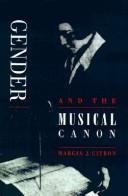| Listing 1 - 5 of 5 |
Sort by
|
Book
Year: 1986 Volume: 342 Publisher: Paris : Les Belles-Lettres,
Abstract | Keywords | Export | Availability | Bookmark
 Loading...
Loading...Choose an application
- Reference Manager
- EndNote
- RefWorks (Direct export to RefWorks)

ISBN: 0521392926 Year: 1993 Publisher: Cambridge [England] ; New York : Cambridge University Press,
Abstract | Keywords | Export | Availability | Bookmark
 Loading...
Loading...Choose an application
- Reference Manager
- EndNote
- RefWorks (Direct export to RefWorks)
Musical canon. --- Music by women composers --- Répertoire classique --- Musique de compositrices
Book
ISBN: 9780754663829 Year: 2008 Publisher: Aldershot, Hampshire, England ; Burlington, VT : Ashgate,
Abstract | Keywords | Export | Availability | Bookmark
 Loading...
Loading...Choose an application
- Reference Manager
- EndNote
- RefWorks (Direct export to RefWorks)
Uighur (Turkic people) --- Maqām --- Minorities in the performing arts --- Musical canon --- History and criticism. --- History and criticism
Book
ISBN: 9782753527522 2753527520 Year: 2013 Publisher: Rennes: Presses universitaires de Rennes,
Abstract | Keywords | Export | Availability | Bookmark
 Loading...
Loading...Choose an application
- Reference Manager
- EndNote
- RefWorks (Direct export to RefWorks)
Pourquoi mettre la musique en répertoire ? Que recherchaient les acteurs de la vie musicale dans ce terme emprunté au théâtre et omniprésent dans le discours des musiciens eux-mêmes depuis la seconde moitié du XVIIIe siècle ? Que change le répertoire à la perception et à la conception de la musique ? Notion polymorphe aux significations historiques complexes, le répertoire exige une approche au croisement de l'histoire, de la musicologie et de la philosophie une esthétique. Remis au coeur de la pensée de la musique, le répertoire devient la pierre angulaire d'une refondation du concept d'oeuvre musicale. En faisant tomber les paradoxes temporels de l'oeuvre, le répertoire permet de penser une temporalité proprement musicale où le classique n'est plus l'imitation extérieure d'un canon. Grâce au répertoire, l'oeuvre plastique n'est désormais plus le modèle de l'oeuvre musicale.
Music --- Musical canon --- Music appreciation --- Musique --- Répertoire classique --- Philosophy and aesthetics --- Philosophie et esthétique --- Appréciation --- Répertoire classique --- Philosophie et esthétique --- Appréciation --- Music appreciation. --- Muziek --- Composition (Music) --- Filosofie en esthetica
Book
ISBN: 9781580465120 1580465129 9781782045410 1782045414 Year: 2015 Publisher: Rochester, NY : University of Rochester Press,
Abstract | Keywords | Export | Availability | Bookmark
 Loading...
Loading...Choose an application
- Reference Manager
- EndNote
- RefWorks (Direct export to RefWorks)
By the 1840s Joseph Haydn, who died in 1809 as the most celebrated composer of his generation, had degenerated into the bewigged "Papa Haydn," a shallow placeholder in music history who merely invented the forms used by Beethoven. In a remarkable reversal, Haydn swiftly regained his former stature within the opening decades of the twentieth century. Reviving Haydn: New Appreciations in the Twentieth Century examines both the decline and the subsequent resurgence of Haydn's reputation in an effort to better understand the forces that shape critical reception on a broad scale. Nosingle person or event marked the turning point for Haydn's reputation. Instead a broad resurgence reshaped opinion in Europe and the United States in short order. The Haydn revival engaged many of the music world's leading figures -- composers (Vincent d'Indy and Arnold Schoenberg), conductors (Arturo Toscanini), performers (Wanda Landowska), critics (Lawrence Gilman), and scholars (Heinrich Schenker and Donald Tovey) -- each of whom valued Haydn's music for specific reasons and used it to advance particular goals. Yet each advocated for a rehearing and rereading of the composer's works, calling for a new appreciation of Haydn's music. Bryan Proksch is assistant professor of music history at Lamar University in Beaumont, Texas, where he specializes in the music of the late eighteenth century.
Music --- Composers --- Musical canon --- Musique --- Compositeurs --- Chefs-d'oeuvre (Musique) --- History --- Histoire --- Haydn, Joseph, --- Criticism and interpretation --- Influences --- Appreciation --- Influences. --- Appreciation. --- Canon, Musical --- Canon (Music) --- Musical criticism --- Haydn, Joseph --- Haydn, Franz Joseph --- Gaĭdn, Ĭ., --- Gaĭdn, Ĭosif, --- Gaĭdn, Ĭozef, --- Haiden, Josip, --- Haidnas, J., --- Haidun, --- Hayden, Joseph, --- Haydn, --- Haydn, F. J. --- Haydn, Franz Josef, --- Haydn, Franz Joseph, --- Haydn, Giuseppe, --- Haydn, Ios. --- Haydn, J. --- Haydn, Jos. --- Haydn, Josef, --- Heyden, Joseph, --- Khaĭdn, Ĭozef, --- היידן, י., --- Changing Reputation. --- Composer Resurgence. --- Haydn. --- Music History. --- Musical Revival. --- Twentieth Century.
| Listing 1 - 5 of 5 |
Sort by
|

 Search
Search Feedback
Feedback About UniCat
About UniCat  Help
Help News
News